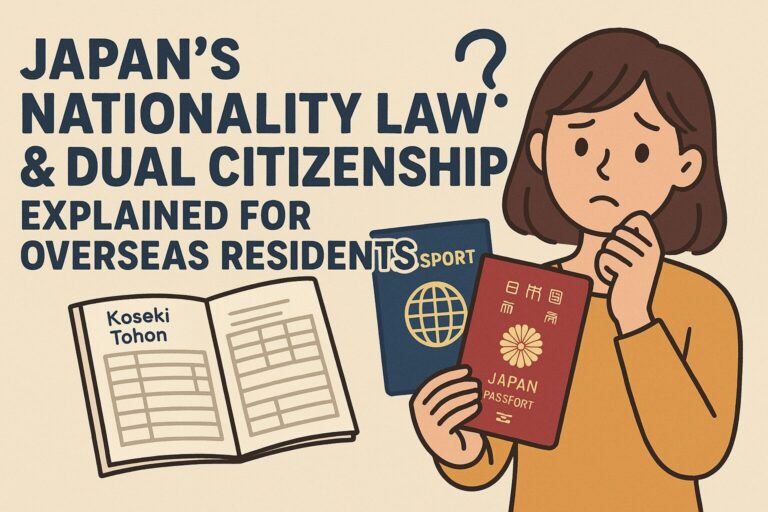Important Notice (Please Read Before Requesting)
Our office strictly complies with Japanese law.
If you have already acquired another nationality,
we cannot judge whether you still hold Japanese nationality,
and we cannot provide any support that may conflict with Japanese nationality law or the Passport Act.
Our service is limited to the lawful retrieval and legalization of existing Japanese certificates.
We cannot guarantee that these documents can be used for Japanese passport renewal or nationality confirmation.
For details, please read the full notice:
【Important Notice】Japanese Nationality, Dual Citizenship, and Passport Renewal – Our Office Policy
Recently, I have received many inquiries from people living overseas who say:
“I would like to renew my Japanese passport, so could you please obtain my Koseki Tohon (family register) or Joseki Tohon (removed family register)?”
Among them, there are quite a few people who say:
“I obtained a foreign nationality, but I still have my Japanese family register and my Japanese passport.”
In other words, they are in a situation that looks like “dual citizenship”.
In this article, I will try to explain in plain language the key points that people often misunderstand, especially for:
-
Those who want to obtain a Koseki Tohon (family register) to renew a Japanese passport
-
Those who would like to keep both Japanese and foreign passports
-
Parents and family members who are worried that their child “might be a dual citizen”
The content is based on Japanese laws such as the Nationality Act and the Act on General Rules for Application of Laws (tsūsokuhō), as well as materials from the Ministry of Justice, reports of the Japanese Society of International Law, and training reports of the Administrative Scriveners Association — reorganized here in an easy-to-understand way.
- 1 1. Situations Where Dual Citizenship Is Likely to Occur
- 2 2. Why Japan Basically Does Not Allow Dual Citizenship
- 3 3. “Can I Just Stay Like This and Keep My Dual Citizenship?”
- 4 4. “If Nobody Notices, Is It OK to Keep Using My Japanese Passport?”
- 5 5. Key Points of Nationality Act Articles 11, 12, and 13
- 6 6. How Dual Nationality Arises at Birth
- 7 7. Deadlines for Nationality Choice for Minors
- 8 8. Legal Effects of Losing Japanese Nationality
- 9 9. Summary and What Our Office Can Help With
- 10 📩 Contact (General Inquiries & Communication)
1. Situations Where Dual Citizenship Is Likely to Occur
Typical situations where dual nationality (multiple nationality) is likely to occur include:
-
Children of international marriages who acquire more than one nationality while still minors
-
A Japanese citizen who marries a foreign national and applies for the spouse’s nationality
-
A foreign national who naturalizes to Japan but does not renounce their original nationality
-
A Japanese citizen who voluntarily obtains a foreign nationality such as U.S., Canadian, or Australian citizenship
In this article, I will mainly focus on the very common pattern:
“A Japanese citizen voluntarily acquires a foreign nationality”
and at the same time touch on patterns where dual nationality arises from birth.
2. Why Japan Basically Does Not Allow Dual Citizenship
(1) Outline of the Osaka District Court Judgment
On 30 September 2025, the Osaka District Court handled a lawsuit filed by a woman who:
-
Married a Canadian man
-
Later acquired Canadian nationality
-
As a result, lost her Japanese nationality under Article 11 of the Nationality Act
She argued that:
“Losing Japanese nationality under Article 11 of the Nationality Act violates
Article 22 (freedom of residence, movement, and renunciation of nationality)
and Article 13 (right to pursue happiness) of the Japanese Constitution.”
The court finally held that:
-
When an individual holds the nationality of multiple states, various problems may arise, such as:
-
Conflicts over diplomatic protection
-
Problems related to passport use and border control
-
Risks of bigamy due to differences in family law systems
-
Overlapping obligations, such as military service
-
-
Therefore, the idea behind Article 11 of the Nationality Act — preventing multiple nationality — is reasonable
and dismissed the plaintiff’s claim.
In other words, as of now, the rule that:
“A Japanese national loses Japanese nationality when they voluntarily acquire a foreign nationality”
is considered constitutional.
(2) Reasons Also Pointed Out in International Law Discussions
According to the Japanese Society of International Law and other experts, the main reasons why Japan basically does not allow multiple nationality are:
-
A person might be required to fulfill citizens’ obligations (such as military service) by more than one country
-
There can be conflicts over diplomatic protection — which country is responsible for protecting the individual
-
Having multiple passports can cause problems in immigration control and border management
-
Due to differences in family and marriage laws, there is a higher risk of bigamy or other complex legal situations
For these reasons, the current Japanese Nationality Act takes the position that:
“As a general rule, Japan does not allow dual citizenship.”

3. “Can I Just Stay Like This and Keep My Dual Citizenship?”
A very common inquiry I receive is:
-
“I want to keep my foreign nationality, my Japanese family register, and my Japanese passport — all of them.”
-
“If Japan finds out that I have dual citizenship, what will happen?”
The important point here is:
From the legal point of view, many people are no longer dual nationals, even if things look that way on paper.
Nationality Act Article 11(1): “Voluntarily Acquiring a Foreign Nationality”
Article 11(1)
“A Japanese national shall lose Japanese nationality when he or she voluntarily acquires a foreign nationality.”
Here, “voluntarily” means:
Acquiring a foreign nationality based on your own decision and application.
Typical examples include:
-
A Japanese citizen who marries a foreign national and applies to obtain the spouse’s nationality
-
A Japanese citizen who applies for Canadian, Australian, U.S., or another nationality for work, immigration, or permanent residence purposes
There are also more complicated examples. For instance, the website of the Embassy of Japan in Russia introduces a case where:
-
A child born in Japan has one Japanese parent and one Russian parent
-
After birth, the parents submit a birth registration to the Russian consulate
-
This birth registration is regarded as an expression of intent to acquire Russian nationality
-
Even though the parents only thought they were submitting a “simple birth registration,” it was legally treated as a voluntary acquisition of foreign nationality, and the child was deemed to have lost Japanese nationality
In this way, foreign nationality can sometimes be interpreted as “voluntarily acquired” even more easily than the person (or parents) intended. This is an important point to be aware of.
4. “If Nobody Notices, Is It OK to Keep Using My Japanese Passport?”
Another frequently asked question is:
-
“After I obtained a foreign nationality, I entered and left Japan using my Japanese passport, and nothing happened.”
-
“Is it safe to travel to Japan on my Japanese passport?”
In practice:
-
In many countries, when a Japanese national acquires that country’s nationality, the information is not automatically sent to Japan
-
Therefore, Japanese authorities often cannot easily know who acquired which foreign nationality and when
As a result:
-
The person’s Japanese family register (koseki) remains as before
-
They can still obtain a Koseki Tohon or Joseki Tohon
-
Their old Japanese passport may still be physically in their possession
So, on the surface, it can look like “nothing has changed” and that the person is still a dual national.
However, this is the crucial point:
Once you have lost Japanese nationality by acquiring a foreign nationality,
continuing to act as a Japanese citizen and using a Japanese passport can, in law, be treated as:
Improper or illegal entry, and/or
A false declaration in passport procedures.
Risk of “False Declaration” in Passport Application
When you apply for a new or renewed Japanese passport, the application form includes questions such as:
-
“Do you hold the nationality of any other country?”
If you actually hold a foreign nationality but answer “No” and submit the form, this may constitute false declaration under Article 23 of the Passport Act.
Furthermore, if it later becomes clear that:
-
You lost Japanese nationality by acquiring a foreign nationality
-
But you continued to use a Japanese passport to enter and leave Japan as if you were still Japanese
then the situation could be seen as:
-
Illegal entry or illegal stay
-
A case requiring an application for special permission to stay (zairyū tokubetsu kyoka)
-
A potential violation of the Passport Act, leading to imprisonment or fines
In other words:
“I’ve been using my Japanese passport for years and nothing happened”
does not mean
“It will always be safe and there is no legal risk.”
This is something I strongly hope readers will understand.
5. Key Points of Nationality Act Articles 11, 12, and 13
(When Do You Lose Japanese Nationality?)
Let us summarize the provisions of the Nationality Act related to loss of Japanese nationality.
5-1. Article 11(1): Voluntary Acquisition of Foreign Nationality
-
When a Japanese national voluntarily acquires a foreign nationality,
they automatically lose Japanese nationality at that time. -
Typical cases:
-
Acquisition of a spouse’s nationality through marriage
-
Naturalization for work, permanent residence, or immigration purposes
-
-
As seen in the Russian example, even submitting a birth registration to an embassy or consulate can be interpreted as “voluntary acquisition” in some circumstances.
5-2. Article 11(2): Dual Nationals Who “Choose” a Foreign Nationality
Article 11(2)
“A Japanese national who holds a foreign nationality shall lose Japanese nationality when he or she chooses the nationality of the foreign country in accordance with its laws.”
This applies when someone already holds both Japanese nationality and a foreign nationality, and:
-
Follows that foreign country’s procedures to formally choose that country’s nationality
For example:
-
A person with both Japanese nationality and another nationality lives in a country that requires dual nationals to declare which nationality they will keep by a certain age
-
If they choose the foreign nationality according to that country’s law, they lose Japanese nationality under Article 11(2).
5-3. Article 12: “Reservation” of Japanese Nationality for Children Born Abroad
Article 12 (simplified)
A person who is born abroad and acquires both Japanese nationality and a foreign nationality at birth may lose Japanese nationality retroactively at birth if they do not express an intention to maintain Japanese nationality.
In practical terms:
-
A child of a Japanese parent is born outside Japan
-
The child acquires both Japanese nationality and the foreign country’s nationality at birth
-
To maintain Japanese nationality, the parents (or legal representative) must file a “declaration to retain nationality” within 3 months of birth, at a Japanese embassy/consulate or a municipal office in Japan
-
If this declaration is not made, Japanese nationality is considered lost retroactively from the time of birth
So, for children born abroad, whether the “declaration to retain nationality” was filed within three months is a very important point.
5-4. Article 13: Voluntary Renunciation of Japanese Nationality
Article 13
A Japanese national who holds a foreign nationality may renounce Japanese nationality by making a notification to the Minister of Justice.
If a person already has a foreign nationality and wishes to voluntarily give up Japanese nationality, they can file such a notification. In this case, they lose Japanese nationality at the time of notification.
6. How Dual Nationality Arises at Birth
(Blood Principle vs. Birthplace Principle)
Why does dual nationality occur in the first place?
The main reason lies in the different rules countries use to grant nationality.
Broadly speaking, there are two main principles:
-
Jus sanguinis (“blood principle”): A child acquires the nationality of their parent(s).
-
Jus soli (“birthplace principle”): A child acquires the nationality of the country where they are born.
Most countries use a combination of these principles.
As a result, dual nationality can arise in situations such as (based on the Ministry of Justice “Nationality Act Q&A”):
-
A child born to a Japanese mother and a father who has the nationality of a country that follows paternal jus sanguinis
-
A child born to a Japanese father or mother and a parent with the nationality of a country that follows bilateral jus sanguinis (either parent’s nationality is passed on)
-
A child of a Japanese parent who is born in a jus soli country
-
A Japanese national who acquires a foreign nationality by recognition (acknowledgment by foreign father), adoption with a foreign national, or marriage to a foreign national
-
A person who acquires Japanese nationality by notification but continues to hold their original foreign nationality
In such cases, the person may be a dual national from birth.
For these people, the rules on nationality choice (at age 18 or 20) described in the next section become important.
7. Deadlines for Nationality Choice for Minors
(The 18- and 20-Year Lines)
So far, we have mainly discussed people who acquired a foreign nationality as adults.
However, for children of international marriages and other people who obtained multiple nationalities while still minors, a different rule applies.
Due to the amendment of the Civil Code which lowered the adult age to 18, the deadlines for nationality choice were also changed from 1 April 2022.
At present, Japan requires:
-
If a person became a multiple national before age 18:
→ They must choose a nationality by age 20. -
If a person became a multiple national at age 18 or older:
→ They must choose a nationality within two years from that time.
(This is based on Article 14 of the Nationality Act and the Ministry of Justice “Nationality Act Q&A”.)
There are also transitional measures depending on the date of birth and when the person became a dual national. If you are worried about your child’s nationality choice, it is advisable to consult an expert with the specific dates and circumstances.
8. Legal Effects of Losing Japanese Nationality
(Relation to the Act on General Rules for Application of Laws)
Losing Japanese nationality is not just a matter of “changing the passport.”
It can also have significant effects on family relations, inheritance, marriage, and other private-law matters.
What Is “Personal Law” (Honpōkoku-hō) Under the Act on General Rules for Application of Laws?
Under the Act on General Rules for Application of Laws (Hō no Tekiyō ni Kansuru Tsūsoku-hō), issues such as:
-
Marriage
-
Divorce
-
Inheritance
-
Adoption
-
Guardianship
are, in principle, governed by the person’s “personal law” — namely, the law of their nationality.
If you lose Japanese nationality, then in situations where Japanese law had previously been applied as your personal law, foreign law may now be applied instead, in principle.
Article 38 of the Act on General Rules for Application of Laws also states (simplified) how to decide the personal law of a person with multiple nationalities:
-
If the person has a habitual residence in one of the countries of which they are a national → the law of that country
-
If not → the law of the country with which they have the closest connection
-
However, if one of the nationalities is Japanese, then Japanese law is treated as their personal law
This means that:
Whether or not someone still has Japanese nationality can directly affect which country’s law applies to their family relations and inheritance.
Therefore, when giving advice on nationality, it is very important to:
-
Clarify when Japanese nationality was lost (if at all), and
-
Explain what kinds of legal relationships might be affected from that time onward.
9. Summary and What Our Office Can Help With
Let us briefly summarize the key points:
-
Japan, as a rule, does not allow dual citizenship.
-
In many cases, when a Japanese national voluntarily acquires a foreign nationality, they lose Japanese nationality at that moment.
-
The fact that a family register (koseki) still exists does not necessarily mean that Japanese nationality still exists.
-
Continuing to use a Japanese passport after losing Japanese nationality carries legal risks, including the possibility of being treated as an illegal entrant, or of committing a false declaration under the Passport Act.
-
Children who are dual nationals from birth are subject to nationality choice rules that use ages 18 and 20 as key milestones.
-
Loss of nationality can affect marriage, divorce, inheritance, and other private-law issues, because the applicable law (personal law) may change.
Based on this, our office can, within the limits of the law, support matters such as:
-
Obtaining Koseki Tohon and Joseki Tohon for former Japanese nationals and people of Japanese descent living overseas
-
Considering possible residence status (visas) for former Japanese nationals who wish to return to Japan
-
Explaining the general flow for reacquisition of Japanese nationality (re-naturalization) in the future
-
Discussing residence status options for those who wish to spend their later years in Japan
At the same time, we do not provide advice or guarantees such as:
-
“If you use this family register, you can safely renew your Japanese passport,” or
-
“As long as nobody finds out, it is fine to keep using your Japanese passport.”
Any advice that assumes violation of Japanese nationality law or the Passport Act is beyond the scope of our services.
Questions about nationality and dual citizenship are very complex.
Online information can be confusing, and it is often difficult to know:
-
“What is actually true?”
-
“How does the law apply to my situation?”
If you are:
-
A former Japanese national who is considering returning to Japan someday
-
A parent or family member who is worried about your child’s dual nationality
-
Someone who wants to clarify and organize their own nationality and residence status
it may be helpful to take a step back and calmly organize your situation first.
For Practical Procedures and Certificate Retrieval
If your main interest is:
“I need official Japanese certificates (such as Koseki Tohon or certificates of acceptance of birth/marriage notification),
and possibly an apostille and English translation, while living overseas,”
please refer to the following article, where I explain in detail:
-
The process for certificate retrieval from Japan
-
Apostille procedures
-
Fees, timeline, and required documents for overseas clients
👉 Apostille & Certificate Retrieval from Japan – Administrative Scrivener Support for Overseas Clients
There you will find step-by-step information on how our office can legally obtain certificates and apostilles on your behalf, no matter where you live in the world.
Important:
For any passport-related Koseki requests, my office requires one of the following identification documents to verify Japanese nationality:
・A valid Japanese passport, or
・A Japanese driver’s license, or
・A MyNumber Card (Japan’s national ID card), or
・If none of the above are available:
An ID issued in the country of residence that clearly shows “Japanese nationality.”
Without one of these documents, I cannot proceed with any request related to confirming Japanese nationality or Japanese passport matters.
This rule is necessary to comply with Japanese law and to ensure that we do not assist in cases involving uncertain nationality status.
Exception for Family-Related Certificates
However, the above rule applies only to cases where the request is related to confirming Japanese nationality or Japanese passport matters.
If you are requesting documents for a family member — for example:
・Certificate of Acceptance of your parents’ marriage
・Certificate of Acceptance of your child’s birth
・Other family-related Japanese civil certificates
— then your own Japanese nationality does not affect the request.
In these cases, our office simply requires:
・Your passport, and
・One additional government-issued photo ID
for identity verification.
This is because the purpose is obtaining a family member’s document, not confirming your own nationality status.
📩 Contact (General Inquiries & Communication)
For updates on an ongoing case, document submission, or other general inquiries, you may contact us through the tools below.
⚠️ Please note that we do not answer visa, residency status, licensing, apostille, or other consultation-related questions through this Contact section.
If you would like to receive advice or guidance, please apply through our paid consultation page.
👉 Click here to book a consultation (Consultation Page)
Contact |
E-mail |
LINE |
WhatsApp |
小红书 |
WeChat |
Office Name: Trust Administrative Scrivener Office
Email: info@trust-gyosei.com


